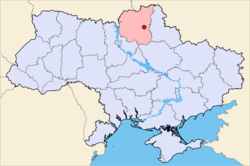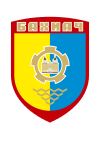Bakhmach
|
Bakhmach Бахмач |
|||
|---|---|---|---|
| Town | |||

Station building of Bakhmach-Pasazhyrsky railway station
|
|||
|
|||
 |
|||
| Coordinates: 51°10′59″N 32°49′47″E / 51.18306°N 32.82972°ECoordinates: 51°10′59″N 32°49′47″E / 51.18306°N 32.82972°E | |||
| Country | Ukraine | ||
| Oblast | Chernihiv Oblast | ||
| Raion | Bakhmach Raion | ||
| Area | |||
| • Total | 18 km2 (7 sq mi) | ||
| Population (January 1, 2015) | |||
| • Total | 18,552 | ||
Bakhmach (Ukrainian: Бахмач, Ukrainian pronunciation: [ˈbɑxmɑt͡ʃ]) is a city located in Chernihiv Oblast (province), in northern Ukraine. It is the administrative center of Bakhmach Raion (district). Population: 18,552 (2015 est.)
Bakhmach was first mentioned in 1147 in the Hypatian Codex. Rapid development began in the 1860s and 1870s when the Libau–Romny Railway line nearby was under construction. The Battle of Bakhmach (Bitva u Bachmače in Czech) was fought between the Czech legion in Russia and German forces occupying Ukraine. Following a Legion victory the Germans negotiated a truce. In January 1919, the city was the site of battles between the invading Bolsheviks forces and the Chornomorska Division, which was attempting to keep the Left-bank Ukraine under the control of the army of the Ukrainian National Republic (UNR). During World War II, Bakhmach was under German occupation from 13 September 1941 and was liberated 9 September 1943 by the 75th Guards Rifle Division.
An ethnographer explains the name of the city:
"The word Bahmach belongs to the ancient Turkish words that were used in Ukraine before the invasion. "Bahmach" in Turkish means "plantations", it indicates that there was, perhaps at the end of the first millennium BC in Kyiv and Chernihiv areas of Turkish people from the Turk hordes, which whom called the land their settlement "
However, the most authoritative historian of the city Bahmach Vladimir Stepanovich Yevfymovskyy indicates that the settlement is based on the Bahmach River, and thus originated in an agriculture tradition.
...
Wikipedia


